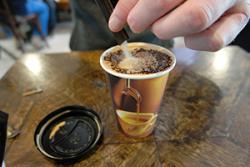Major Coffee chain’s interest in Biobased and compostable plastic coffee cup lids
 With 2.5 billion takeaway coffee cups being used in Britain each year, there are almost as many plastic lids being thrown away.
With 2.5 billion takeaway coffee cups being used in Britain each year, there are almost as many plastic lids being thrown away.
Scientists are working with industry in to develop a new compostable plastic, which will withstand the hot liquids and can be specially moulded for coffee cup lids.
A meeting in London this week (Monday 23 April) will bring the renewable material scientists and plastics manufacturers together with other interested parties to move the project forward.
As Rob Elias, Director of BC Centre Bangor University says;
“Plastic disposal or replacement is a complex issue as many of these plastics have different components. It should be recognised that there is not a simple one stop solution for every product or application.
No one would argue that we should be getting rid of all the plastic we use in our lives, but these materials do play an important role, for example in the food supply chain. For example, packaging prevents damage to food, increases the shelf life of perishable items and reduces waste. Our studies with farmers in remote regions in countries like Uganda provide another illustratuion. Here farmers have to transport their food over long distances on bumpy roads. Using sustainable and affordable biobased materials as packaging will really help them reduce waste and add more value to their products. However here in the UK the challenge is to ‘close the loop’ and have the infrastructure enabling single use items to be immediately collected for reuse or composting” added Rob.
The compostable plastic which can be moulded into coffee lids will be developed under an Innovate UK project. This type of plastic also has other applications. The compostable heat-tolerant plastic to be produced could also be used as agricultural ‘mulch films’ which keep the ground warm to encourage fruit and vegetable growth while inhibiting weed growth. These materials are widely used by farmers across the globe and help to maintain crop productivity.
Project partners the BC Centre, at Bangor University provide companies with specialist lab and research facilities. They have a 25 year track record of researching renewable materials to replace oil- derived non renewable materials. Wells Plastics Ltd in England are the lead partners. They are a specialist additive masterbatch and compounding company and their expertise is needed to get the right material performance. Welsh packaging producer, Dragon Packaging, are specialists in providing food packaging and their knowledge will help provide a route to market for the new Biobased plastics.
The project will develop a biobased polymer system with advanced properties that make it suitable for applications where high temperature heat performance is needed.
Publication date: 20 April 2018
